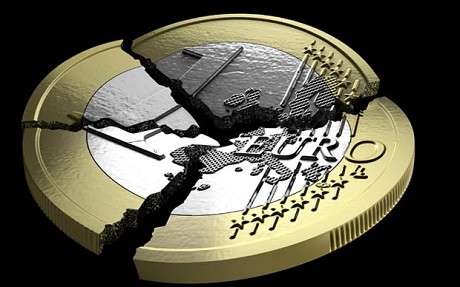We never left crisis mode. Everything just got much worse.
See also:
– How The ECB Is Turning Spain Into Greece
– Spain CDS Surges Just Shy Of Record As Spanish Bank ECB Borrowings Go Parabolic
– Spain: The Ultimate Doomsday Presentation
– Next Up Spain: OpenEurope Looks At Spanish Banks’ Underprovisioned 20% In Toxic Loans
– Spain Has ‘Worse Problems Than Greece’: Analyst
– EU: EFSF & ESM … A Whole Lot Of Nothing!
– EURO GOVT-Spanish yields top 6 pct as debt crisis flares (Reuters, April 16, 2012):
* Spanish 10-year yields top 6 percent, contagion fears rise
* German 10-year Bund yields hit record lows
* Markets speculate ECB may resume bond-buying programme
LONDON, April 16 (Reuters) – Spanish 10-year government bond yields broke above 6 percent for the first time this year on Monday as concerns over the country’s ability to keep its finances under control pushed debt markets back into “crisis mode”.
Spanish yields were expected to rise further towards the panic-triggering 7 percent level beyond which debt costs are widely seen as unsustainable unless the European Central Bank resumes its bond purchases after a two-month break.
Yields on Germany’s benchmark 10-year Bund, viewed as the euro zone’s safest debt, hit a record low of 1.628 percent. The previous record was established in November 2011, at the height of the debt crisis before the ECB injected around 1 trillion euros of cheap three-year funds into the banking system.
“We’re back in full crisis mode,” Rabobank rate strategist Lyn Graham-Taylor said.
“It is looking more and more likely that Spain is going to have some form of a bailout. Assuming there is not an (ECB) intervention you would not see a cap on Spanish yields, they would just keep increasing.”
The latest blow to Spanish markets followed data on Friday that showed record borrowing by its banks from the ECB. Investors’ main fear is that banks parked most of the funds in domestic government debt, making them more vulnerable to sovereign stress.
Spain faces a test of investor confidence this week with an auction of two- and 10-year bonds on Thursday.
Spanish 10-year yields rose 16 basis points at 6.15 percent, five-year yields topped 5 percent, while two-year yields spiked to 3.70 percent, all 2012 highs.
Six percent is psychologically important for markets as the pace at which yields rise has accelerated on previous occasions when that level was broken. Beyond 7 percent, Greece, Portugal and Ireland struggled to raise cash in the market and were forced to seek financial aid.
Underlining investor fears, the cost of insuring Spanish debt against default hit a record high of $520,000 a year to buy $10 million of protection.
Contagion fears pushed Italian 10-year yields about 12 bps higher on the day at 5.66 percent.
Speculation the ECB could soon step in to ease the pressure was rife, although investors feared its bond-buying programme may have lost some of its potency after the central bank was given preferential treatment in Greece’s debt restructuring.
The ECB seems reluctant to resume bond purchases, with Governing Council Member Klaas Knot saying on Friday he hoped the bank never has to use the programme again.
“The problem … is that the bigger the position the ECB builds in a sovereign’s debt, the greater the private sector holders are likely to perceive their probability of default,” Credit Agricole rate strategist Peter Chatwell said in a note.
“As such, the (programme) might be used more sparingly than in the past and we expect spreads to be less sensitive to any buying than they were last year.”
Also stretching nerves in bond markets were signs that the world’s largest economies were hesitant to raise new resources for the International Monetary Fund to contain the euro zone crisis.
“ECB members are not overly excited about resuming the buying. Also there are signs from the IMF that it needs more time to agree on the … extension and markets are preparing for the Spanish auction on Thursday so the risk aversion is set to continue,” Commerzbank rate strategist Rainer Guntermann said.
This meant Bund futures should break above their record high of 140.52 and head towards 141.20, a level projected by a trendline connecting recent highs, Guntermann said.
